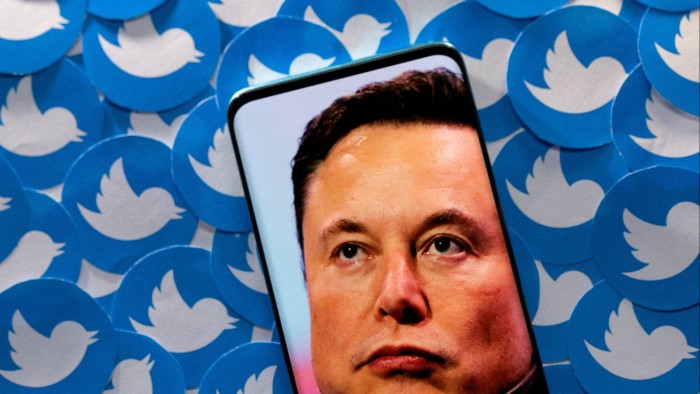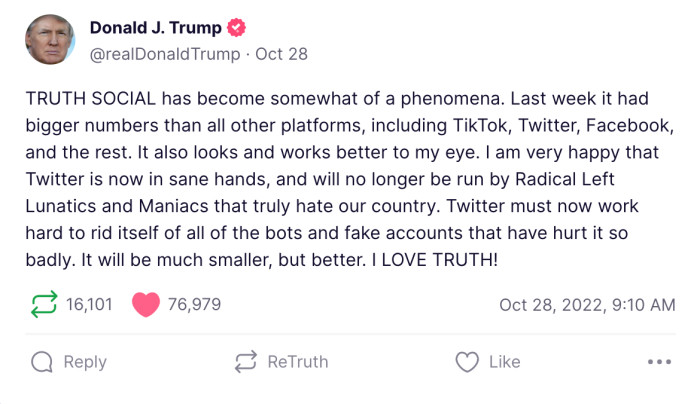Elon Musk’s coming out election party

This article is an on-site version of our Swamp Notes newsletter, part of an FT Premium subscription. If you would like to upgrade to Premium, please visit your FT Settings & Account page. Existing Premium subscribers can sign up here to get the newsletter sent straight to your inbox every weekday during the week of the US midterms
You may not yet know it but we are lab rats in a US democracy experiment. The scientist in charge keeps issuing conflicting messages — he is not the level-headed type. It is nevertheless going ahead. The experiment’s crux is to watch the disinformation impact on the US midterm elections days after the world’s most influential political platform abruptly gets rid of most of its safety checks. Last Friday, four days before the US midterm elections, Elon Musk fired half of Twitter’s staff. Some units, including its ethics, transparency and accountability team, were eliminated. Others that monitor election misinformation and content moderation have cut between 15 per cent and three-quarters of their staff.
The result is a surge in dark nonsense about election fraud and ballot box stuffing that will allegedly take place on Tuesday. In contrast to the last midterm in 2018 and the last presidential election in 2020, Twitter has stopped bothering to even regulate or put warning labels on outright lies — let alone suspend accounts that do that. At Musk’s personal intervention, the site is actually restoring suspended accounts that peddle myths about election fraud (see Mark Finchem, the Republican candidate for Arizona’s secretary of state). As a result, the site — and the broader internet — is awash in election conspiracy talk that could make the already fraught job of calmly counting ballots on Tuesday much harder.
Who cares, you might ask? Swampians who are not on Twitter might dismiss these shenanigans as a sideshow that will have at worst a marginal impact on Tuesday’s results. “Twitter is not real life,” you will point out. There is some merit to that line. But it depends on how you think about it: Twitter is not real life in the same way that online banking is not real banking, and Zoom meetings are not real meetings. Would Donald Trump have become president in 2016 without his Twitter account?
Now, back to Musk. He has just become lord and master of America’s most important digital public square on the eve of what I have written about as the mother of all midterm elections. His probity is very much in question. Last week, Musk was a key booster — probably the key booster — in the false conspiracy chain that insinuated that Nancy Pelosi’s husband, Paul Pelosi, was the victim of a gay tryst gone wrong rather than an extremist who broke into his home. Musk linked to a piece on a site that is notorious for trafficking in false conspiracy. There was no basis to the story. Musk later deleted his tweet. It was itself an example of the kind of dark mythmaking that mints individuals such as David DePape — the man who allegedly fractured Pelosi’s skull with a hammer. For a breakdown of the Pelosi conspiracy chain read this forensic New York Times piece.
Last week Musk complained that vanishing Twitter advertisers, such as GM, Pfizer and Audi, were succumbing to pressure from “leftwing activists” to suspend their advertising. But these companies almost certainly have more immediate concerns, such as the disappearance of content moderation. Since Musk’s takeover, use of the “N-word” and anti-Semitic tropes have soared on the platform. It is hardly a suitable climate for household brands to promote themselves. For an insight into how Musk’s mind works, read this fascinating response to him from an advertising executive, who pointed out the dangers to household brands. Musk promptly blocked the ad exec’s Twitter account. For a proprietor who claims to champion free speech and hate snowflakes it was a confusing response — but also revealing.
Now, consider whether it is good for US democracy that someone like Musk, the richest person in the world, is running America’s most influential digital platform during an election. Some of you will say: “It’s fine, Twitter is a private company. Musk paid $44bn for it and he can do what he likes.” To which my response would be, America’s monopoly laws badly need updating to take into account “impact on democracy” as well as effect on consumer prices. Rana, I am sure you will have insights to add to this debate. What happens to a democracy when half its electorate does not trust the voting process? I will leave the last word to Trump, whose response to Musk’s Twitter takeover was: “I am very happy that Twitter is now in sane hands.”

Recommended reading
My colleague Lauren Fedor has a vivid account of the final weekend of midterm campaigning — Barack Obama overshadowing Joe Biden as the star of the Democratic line-up. Like Trump, the Democratic big names have been focusing heavily on Pennsylvania, which could hold the key to whether Democrats or Republicans control the Senate after Tuesday.
In the NYT, Maureen Dowd makes the chilling observation that the likely Republican recapture of the House of Representatives will usher in many more Marjorie Taylor Greene type lawmakers. Inside Greene’s bubbling cauldron of wild conspiracies are some inadvertently amusing ones. I particularly like her ones about “corporate communists”.
Finally, an essential look at the condition of the world’s other massive democracy, India, in an important Foreign Policy piece by my friend, Ramachandra Guha, who writes about the cult of Narendra Modi. If you want to see writing on the wall (and have a shot at editing it), pay attention to India.
PS Join Edward Luce, Rana Foroohar, James Politi, and veteran commentator Norm Ornstein on November 10 for a subscriber-exclusive webinar staged with the Swamp Notes newsletter to discuss the US midterm results. Register free today here and submit your questions in advance for our panel.
Rana Foroohar responds
I think we all know what happens when half the votership doesn’t trust the process. The question is how we got to the place where that’s possible. I’d argue that the entire business model of targeted advertising was pushing us there long before Elon Musk took over Twitter. He’s certainly a danger, but surveillance capitalism is the bigger problem. It’s a business model designed to appeal to and perpetuate our worst impulses.
In my dreams, the entire model would be banned; sadly, that won’t happen. So, ironically, you now get an American oligarch like Musk trying to move Twitter to a subscription model, which is ultimately going to push some people off the platform. The question is how many, and how quickly. Will you leave Twitter? Will I? I have to say I’m thinking about it, not only because of everything you outline above, but also because I’ve never seen it as a digital town square, but more a place where the chattering classes (me included) amplify each others’ existing beliefs. The truth is that it is people like us, and all users of Twitter, really, who give Musk the power to do what he does.
You suggest that antitrust rules need to change, and they are changing, slowly — the new Brandeis contingent at the Federal Trade Commission, Department of Justice, and in the White House are all trying to push forward the notion that power, not just price, matters when considering whether corporations have monopoly power. But whether these people have more than another 24 months to do their job will depend on what happens not just on Tuesday, but over the next two years.
Your feedback
And now a word from our Swampians . . .
In response to “China’s economic game of dominoes”:
“India is wonderfully disorganised and lacking in central control, which in my opinion will be key drivers of future growth, alongside a young and aspirational demographic. Modi’s Hindu racism is however deplorable and a worry. China’s real estate crisis and Xi’s control freakery will not serve it well. Han Chinese racism is more targeted and, in my opinion, deadly compared to the attitude of Indian’s Hindus towards their Muslim compatriots.” — Neil Woodcock, Edinburgh, Scotland
Your feedback
We'd love to hear from you. You can email the team on swampnotes@ft.com, contact Ed on edward.luce@ft.com and Rana on rana.foroohar@ft.com, and follow them on Twitter at @RanaForoohar and @EdwardGLuce. We may feature an excerpt of your response in the next newsletter
Comments